- Joined
- 27 Jan 2008
- Messages
- 28,084
- Reaction score
- 3,408
- Location
- Llanfair Caereinion, Nr Welshpool
- Country

I do see your point, we often exceed the ratings of devices, mainly because some think has changed and no one has checked, having a 8 kW shower on a 32 amp MCB for example, but in that case worse case scenario is it trips.
I have seem 10 amp MCB's feeding ceiling roses which double as junction boxes which are rated at 6 amp, and it is very unlikely the ceiling rose will not handle 10 amp, however I can see the ceiling rose with all it's components and be sure it can take 10 amp even if rated at 6 amp.
With a RCD I can't assess the ability of the internal components to take over the rated current, looking at 40, 63, 80 and 100 amp

I see no difference other than the markings on them, I don't believer a manufacturer would make 4 RCD's with different ratings if they could get away making one. There must be some thing different, and I do not know the result in over loading the device.
From early days we have had small differences in devices allowing different currents the old Wylex fuse box main switch was rated 60 amp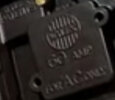 the fuse carriers
the fuse carriers 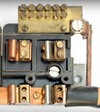 had the first one with different metal to take a larger fuse, and putting the larger fuse in the other carriers did cause damage
had the first one with different metal to take a larger fuse, and putting the larger fuse in the other carriers did cause damage 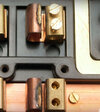 in this case we could see the damage. Yes I know we can buy populated consumer units where the total of the MCB's exceeds the RCD ratings,
in this case we could see the damage. Yes I know we can buy populated consumer units where the total of the MCB's exceeds the RCD ratings, 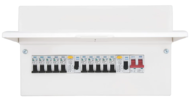 but as long as the DNO fuse is 60 amp this is not a problem, it only becomes a problem if the DNO change the fuse to over 60 amp, so if this consumer unit was fitted to a home wanting the supply upgrading for EV charging, then the electrician would need to change components in the consumer unit, the unit does have three neutral bars
but as long as the DNO fuse is 60 amp this is not a problem, it only becomes a problem if the DNO change the fuse to over 60 amp, so if this consumer unit was fitted to a home wanting the supply upgrading for EV charging, then the electrician would need to change components in the consumer unit, the unit does have three neutral bars 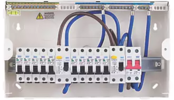 so using some RCBO's the load could be dropped on each RCD, and one would not want the EV charging point to use the same RCD as rest of house anyway, this 5 bedroom house on three floors has a 60 amp DNO fuse, when I moved in the Wylex fuse box isolator was only rated at 60 amp, now the new consumer units does have a 100 amp isolator so could be uprated, but unless it blows I would not expect that to be done, but where you find a consumer unit with 63 amp RCD's and 100 amp fuse, how do you point finger are electrician fitting CU or DNO as in the main no idea which was fitted first.
so using some RCBO's the load could be dropped on each RCD, and one would not want the EV charging point to use the same RCD as rest of house anyway, this 5 bedroom house on three floors has a 60 amp DNO fuse, when I moved in the Wylex fuse box isolator was only rated at 60 amp, now the new consumer units does have a 100 amp isolator so could be uprated, but unless it blows I would not expect that to be done, but where you find a consumer unit with 63 amp RCD's and 100 amp fuse, how do you point finger are electrician fitting CU or DNO as in the main no idea which was fitted first.
So as electricians the big question is if a 63 amp RCD on a 100 amp DNO fuse is potentially dangerous? If yes we give it a code C2, if not then only a code C3 and I would say latter, in fact not sure it would even be coded, code 4 has gone. Maybe a thread questionnaire would be interesting?
I have seem 10 amp MCB's feeding ceiling roses which double as junction boxes which are rated at 6 amp, and it is very unlikely the ceiling rose will not handle 10 amp, however I can see the ceiling rose with all it's components and be sure it can take 10 amp even if rated at 6 amp.
With a RCD I can't assess the ability of the internal components to take over the rated current, looking at 40, 63, 80 and 100 amp
I see no difference other than the markings on them, I don't believer a manufacturer would make 4 RCD's with different ratings if they could get away making one. There must be some thing different, and I do not know the result in over loading the device.
From early days we have had small differences in devices allowing different currents the old Wylex fuse box main switch was rated 60 amp
 the fuse carriers
the fuse carriers  had the first one with different metal to take a larger fuse, and putting the larger fuse in the other carriers did cause damage
had the first one with different metal to take a larger fuse, and putting the larger fuse in the other carriers did cause damage  in this case we could see the damage. Yes I know we can buy populated consumer units where the total of the MCB's exceeds the RCD ratings,
in this case we could see the damage. Yes I know we can buy populated consumer units where the total of the MCB's exceeds the RCD ratings,  but as long as the DNO fuse is 60 amp this is not a problem, it only becomes a problem if the DNO change the fuse to over 60 amp, so if this consumer unit was fitted to a home wanting the supply upgrading for EV charging, then the electrician would need to change components in the consumer unit, the unit does have three neutral bars
but as long as the DNO fuse is 60 amp this is not a problem, it only becomes a problem if the DNO change the fuse to over 60 amp, so if this consumer unit was fitted to a home wanting the supply upgrading for EV charging, then the electrician would need to change components in the consumer unit, the unit does have three neutral bars  so using some RCBO's the load could be dropped on each RCD, and one would not want the EV charging point to use the same RCD as rest of house anyway, this 5 bedroom house on three floors has a 60 amp DNO fuse, when I moved in the Wylex fuse box isolator was only rated at 60 amp, now the new consumer units does have a 100 amp isolator so could be uprated, but unless it blows I would not expect that to be done, but where you find a consumer unit with 63 amp RCD's and 100 amp fuse, how do you point finger are electrician fitting CU or DNO as in the main no idea which was fitted first.
so using some RCBO's the load could be dropped on each RCD, and one would not want the EV charging point to use the same RCD as rest of house anyway, this 5 bedroom house on three floors has a 60 amp DNO fuse, when I moved in the Wylex fuse box isolator was only rated at 60 amp, now the new consumer units does have a 100 amp isolator so could be uprated, but unless it blows I would not expect that to be done, but where you find a consumer unit with 63 amp RCD's and 100 amp fuse, how do you point finger are electrician fitting CU or DNO as in the main no idea which was fitted first.So as electricians the big question is if a 63 amp RCD on a 100 amp DNO fuse is potentially dangerous? If yes we give it a code C2, if not then only a code C3 and I would say latter, in fact not sure it would even be coded, code 4 has gone. Maybe a thread questionnaire would be interesting?

